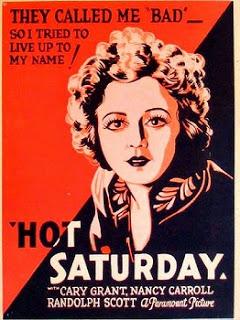
Directed By: William A. Seiter
Starring: Cary Grant, Nancy Carroll, Randolph Scott
Tag line: "Her lips offered..what her heart denied!"
Trivia: Carole Lombard was mentioned for the role eventually played by Nancy Carroll
My journey through the pre-code landscape continues with 1932’s Hot Saturday, an effective comedy / drama that draws the curtain back on small-town America, where idle gossip has the power to destroy a person’s life. The fact that the movie also features a pair of Hollywood superstars early in their careers doesn’t hurt matters, either.
Welcome to Marysville, a seemingly peaceful community that’s so tiny it has only one bank. Ruth Brock (Nancy Carroll), a pretty young woman who still lives with her parents (William Collier Sr. and Jane Darwell), is one of the bank’s many employees. Ruth takes her job very seriously, but like most girls her age you’ll find her at the Willow Springs dance hall once Saturday evening rolls around.
One particular Saturday, before heading out to Willow Springs, Ruth and her date, Conny (Edward Woods), join the rest of their gang, including Archie (Grady Sutton) and Eva (Lillian Bond), at the estate of Romer Sheffield (Cary Grant), a millionaire playboy whose romantic trysts have made him the talk of the town. Romer, it turns out, has the hots for Ruth, and while she too has feelings for him, Ruth knows that getting involved with a so-called “womanizer” like Romer has its consequences, especially in Marysville, where everybody knows everyone else’s business.
But when an act of kindness by Romer is misinterpreted, poor Ruth finds herself caught up in a scandal that threatens to ruin her career. Convinced she’s on the fast track to becoming a pariah in Marysville, Ruth agrees to marry Bill Fadden (Randolph Scott), an old childhood friend who’s returned to town temporarily, and who has loved Ruth ever since they were kids. Fearing that Bill might hear some of the terrible gossip circulating about her and Romer, Ruth does what she can to hurry the wedding along. But is she truly in love with Bill, or does her heart belong to another?
Nancy Carroll turns in a sincere performance as the good girl whose reputation is systematically torn to shreds, and Jane Darwell, who would win an Oscar eight years later for The Grapes of Wrath, is equally good as Ruth’s domineering mother. That said, what makes Hot Saturday something of a modern-day curiosity is the appearance of both Cary Grant and Randolph Scott, each of whom would go on to bigger and better things (Grant refined his comedic flair in such classics as His Girl Friday and Bringing Up Baby, while Scott became a western star whose work with Budd Boetticher, i.e. 7 Men From Now and The Tall T, is worth noting). Grant is especially strong as the lovesick Romer, proving beyond a shadow of a doubt that he was leading man material (Hot Saturday marked the first time he played a major role in a Hollywood film).
As for content, Hot Saturday definitely has its share of suggestive material; Ruth’s friends like to get drunk and even a little wild on Saturday night (before heading off to Willow Springs, Archie steals some liquor from Romer’s bar), and the guys clearly expect the girls to “reward” them for paying for their evening out. But as bawdy as the youngsters can be at times, it’s their parents who receive the brunt of the movie’s scorn. Ruth’s mother cares more about her family’s social standing than she does her own daughter, while the members of the women’s auxiliary pass the time by spreading gossip and innuendo (at one point, director Sieter focuses his camera on a phone operator’s switchboard, which is lighting up as the women of Marysville call each other to discuss Ruth’s “indiscretion”).
Small town America can, indeed, be idyllic (Frank Capra proved as much in It’s a Wonderful Life), but as we see in Hot Saturday, it can also be a living hell.
